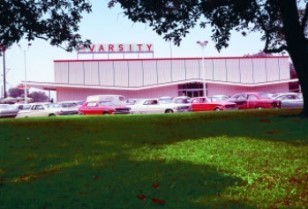A documentary film is in production to highlight that struggle.
The Varsity opened its now current Athens location in 1963. The company's former downtown Athens location, now the home of Five Guys Burgers and Fries, served African-Americans through a walk-up window. They weren't allowed to step inside the restaurant as customers, according to civil rights protesters.
At the Milledge and Broad Varsity, young black Athenians worked as car hops, delivering milk shakes and fries from the Varsity kitchen to white-driven cars. But African-Americans weren't served.
In 1964, civil rights protesters based out of Athens churches set their sights on the West Broad Varsity.
Many times between 1963 and 1964, groups of African-Americans left Ebenezer Baptist Church West on Broad Street to protest the restaurant's policy of segregation. The largest protest was said to have taken place in the spring of 1964. The Ku Klux Klan counter-protested. Many black protesters went to jail, including a few Athenians who would go on to prominent careers in government, law and the academy.
"We saw what was happening in Greensboro (North Carolina, site of ground-breaking lunch counter sit-ins) and we thought we needed to integrate this new establishment," said Charlie Maddox, who marched in front of the Varsity in 1964.
Maddox is a reverend at Hill's Chapel Baptist Church, a former Athens mayoral candidate and a retired U.S. Department of Labor employee.
In part to mark the 50th anniversary of the 1964 Civil Rights Act, Maddox, Dious and other veterans of the Varsity protests recently gathered at Ebenezer West to be interviewed by documentary filmmakers seeking to shine a light on how the civil rights movement played out in Athens, specifically through the story of the Varsity protests.
Native Athenians Nicole Taylor and Gabrielle Fulton, now residents of Brooklyn and Atlanta, respectively, are making a short documentary about the subject with support from the Southern Foodways Alliance, a University of Mississippi-based organization, and its Greenhouse film series.
Taylor said she pitched the Varsity documentary to the alliance knowing there was always a story to be told in her hometown.
"My desire to learn about the contributions of African Americans started here in Athens," said Taylor, a 1996 graduate of Clarke Central High School. "Athens created a great foundation to go out into the world and tell stories."
Taylor, Fulton and their crew spent last weekend interviewing, filming and researching the film for release in late spring or early summer.
Taylor remembered high school nights after football games when black students regularly gathered at the Varsity and Dairy Queen on Broad Street. Her elders, she said, reminded the teens that at one time those restaurants were off limits for African Americans.
Maddox recalled being able to order food from Dairy Queen next door to the Varsity, depending on who was working. Some days, blacks would be run off the picnic tables, he said. Other days, they were welcomed.
"That's why the Varsity was the focus (of the protests)," Maddox said.
The protests became heated, civil rights attorney Ken Dious recalled, after the Klan and civil rights marchers were allowed to walk the same sidewalk during one protest.
Some brandished guns. Others threw bricks.
Broad Street traffic came to a standstill, Dious said. Police hauled off plenty of protesters to the city jail.
"At that age, I wasn't afraid of anything," said Maddox, 18 years old at the time. "We saw (the Klan) as older rednecks; ignorant. We were part of a change that was coming."
Ed Turner, an educator and a Athens city councilman in the 1980s, remembered the blacks who "hopped cars" at the Varsity acting as spies for the protest, keeping the marchers informed about what restaurant management knew or had planned.
"They had our back," Turner said. "That's what gave our efforts so much impact."
Maddox said E. T. Holmes, the football coach for Athens High and Industrial School, Athens' high school for black students in 1964, met his players, including Maddox, at the jail and pleaded for their release. Holmes drove Maddox and his protesting teammates home.
"He was proud of us," Maddox recalled. "He couldn't tell us (to go protest), but he was proud we did. Then he told us to get back to practice."
Lunch counters and drive-ins like the Varsity were particularly interesting segregation protest points as so many African-Americans relied on such businesses for employment, said Robert Harrison, a marcher and current executive director of the Institute for Community and Organizational Development.
"So many of our parents were dependent on white-owned businesses," he said. "It was a delicate line that we balanced."
For attorney Ken Dious, also a Democratic congressional candidate in the 10th district, taking the civil rights fight to the Varsity was simple: "I felt everyone should have a right to go into the Varsity if they wanted to," he said. "But once they integrated, I found out I didn't like hotdogs."

Photo from TheVarsity.com
http://accesswdun.com/article/2014/3/271827
